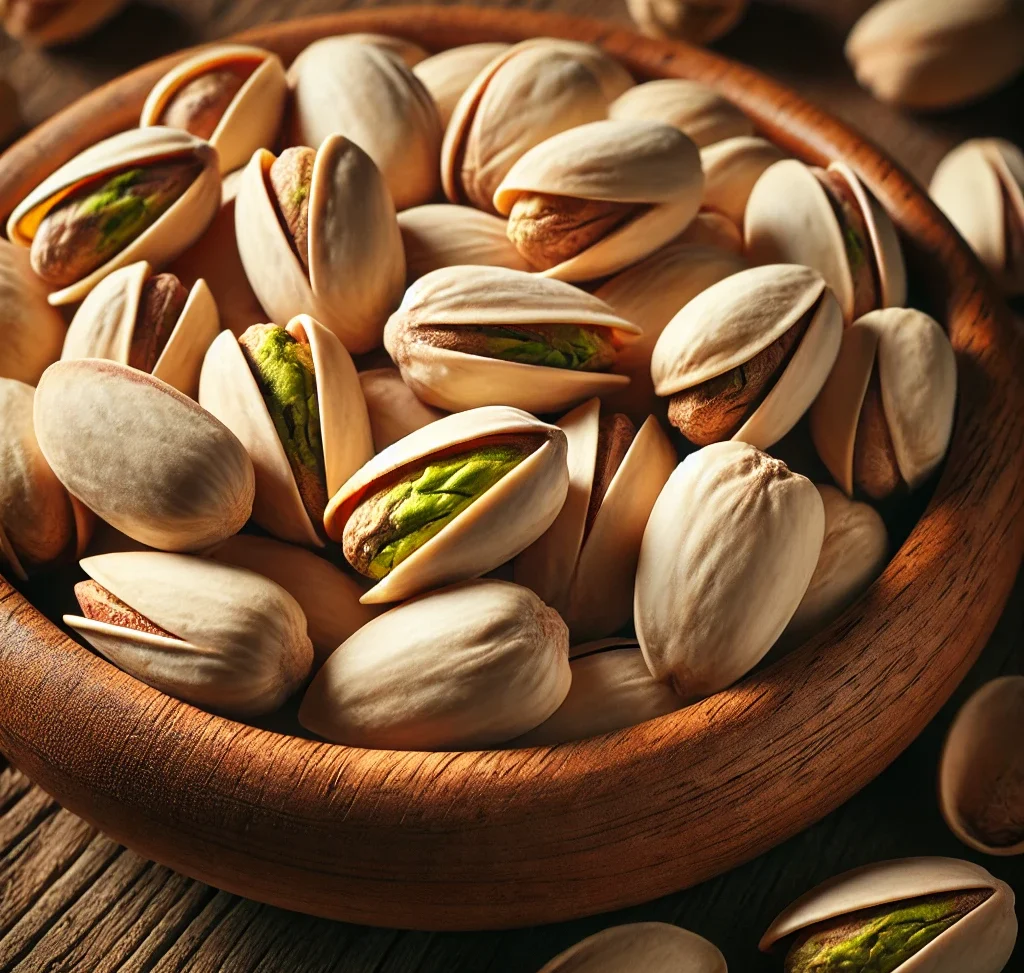Pistachios are a delicious and nutrient-dense snack that offers a wide range of health benefits. Packed with protein, healthy fats, fiber, and essential vitamins and minerals like vitamin B6, potassium, and antioxidants, these green-hued nuts support heart health, aid in digestion, and help maintain energy levels. Whether enjoyed on their own, added to salads, or used in desserts, pistachios are a tasty and convenient way to enhance your diet
Nutritional Benefits of Pistachios
Rich in Nutrients: Pistachios are a good source of essential nutrients, including plant-based protein, healthy fats, vitamins (such as vitamin B6, vitamin E and carotenoids), and minerals (such as potassium, magnesium, and phosphorus).
Packed with Antioxidants: Pistachios are loaded with antioxidants, including vitamin E, lutein, and zeaxanthin. These antioxidants help protect the body from oxidative stress, reduce inflammation, and may lower the risk of chronic diseases like heart disease, cancer, and age-related eye conditions.
Boosts Immune Function: Pistachios are rich in vitamins and minerals, such as vitamin B6 and zinc, which play an important role in maintaining a healthy immune system, helping the body fight off infections, and promoting overall well-being.
Source of Plant-based Protein: Pistachios are a great source of plant-based protein, providing about 6 grams of protein per ounce. This makes them an excellent option for vegetarians, vegans, or anyone looking to increase their protein intake for muscle repair, immune function, and overall health.
Heart-Healthy Fats: Pistachios are rich in monounsaturated and polyunsaturated fats, which are considered heart-healthy fats. These fats help lower bad cholesterol (LDL) levels and reduce the risk of heart disease. They also contain omega-3 fatty acids, which contribute to improved cardiovascular health.
Rich in Fiber: Pistachios provide a good amount of dietary fiber, which supports digestive health by promoting regular bowel movements and preventing constipation. Fiber also helps regulate blood sugar levels, making pistachios a great choice for people with diabetes or those looking to maintain stable blood sugar.
Improves Gut Health: The fiber content in pistachios helps promote a healthy gut microbiome by supporting the growth of beneficial gut bacteria. This can lead to improved digestion and overall gut health.
Supports Weight Management: Despite their calorie density, pistachios can help with weight management due to their high fiber and protein content. These nutrients promote feelings of fullness and satiety, helping to curb overeating and support healthy weight control.
Promotes Healthy Blood Sugar Levels: The combination of protein, fiber, and healthy fats in pistachios helps regulate blood sugar levels. Studies suggest that pistachios may improve insulin sensitivity, making them beneficial for managing type 2 diabetes.
Supports Bone Health: Pistachios are a good source of key minerals like calcium, magnesium, and phosphorus, which are essential for maintaining strong bones and preventing bone-related conditions like osteoporosis.
Boosts Eye Health: Pistachios contain lutein and zeaxanthin, two antioxidants that play a key role in protecting the eyes from age-related macular degeneration and cataracts. These antioxidants help filter harmful blue light and protect the retina.
Uses of Pistachios
Snacks: Pistachios can be enjoyed raw, roasted, or salted as a nutritious snack.
Culinary Uses: They can be used in a variety of dishes, including salads, desserts, and main courses. Ground pistachios are often used as a topping or ingredient in pastries and ice creams.
Pistachio Oil: Extracted from the nuts, pistachio oil can be used in cooking and salad dressings for its unique flavor.
Nut Butters: Pistachio butter is a delicious alternative to traditional nut butters and can be used in spreads or smoothies.
Safety Considerations
Allergies: Some individuals may have allergies to pistachios or other tree nuts. Symptoms can range from mild to severe, including anaphylaxis. Those with known nut allergies should avoid pistachios.
Caloric Density: While pistachios are nutritious, they are also calorie-dense. Portion control is important, especially for individuals managing their weight.
Sodium Content: Salted pistachios can be high in sodium, which may not be suitable for individuals on a low-sodium diet. Opting for unsalted varieties can help mitigate this concern.
Interactions with Medications: Pistachios may interact with certain medications, particularly those affecting blood pressure or cholesterol levels. Consult a healthcare provider if you are on medication.
Conclusion
Adding pistachios to your diet is a flavorful and nutritious way to support your health. Their rich combination of protein, fiber, and heart-healthy fats makes them a satisfying snack that promotes overall well-being. Enjoyed in various forms, from snacks to culinary ingredients, pistachios offer a versatile and delicious option for boosting nutrition. By making them a regular part of your diet, you can enjoy their numerous health benefits while savoring their unique taste and crunch.
